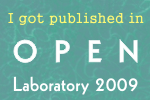I recently attended a conference which was unusual for me as most of the speakers come from a computer science culture, rather than a biology one. Somewhat outside my comfort zone. The science that was discussed was quite different from the more biological bioinformatics meetings: the reason being the motivation of the scientists, and what […]
Fakeference invitation: an email from Nancy, Sally or June, inviting you, for the second time (“perhaps you didn’t get my first invitation, there may be something wrong with my email”) to speak at a conference. The meeting has 5-10 Nobel laureates listed as invited speakers, and covers everything in science, from quantum mechanics to fish breeding. […]
After a series of tweets and a couple of Facebook posts about the problems of the Journal Impact Factor (JIF), I was approached by a colleague who asked me: “so why are you obsessed with this”? My answer was that it irks me that I have to use the JIF next to my publications in […]
The sequester is hitting science funding in the US pretty hard. Francis Collins, the director of the NIH, is lobbying any way he can to get the NIH off the hook. In 2013, there will be 700 fewer grants awarded than in 2012. 4.7% cuts across the board to grant renewals. So, here’s […]
“Our aim here is to maximize amusement, rather than coherence.” SCIgen developers Joke papers have been known to sneak into otherwise serious publications. Notably, in the Sokal Affair, Alan Sokal, a physicist, published a nonsense paper in Social Text, a leading journal in cultural studies. After it was published, Sokal revealed this paper to be a parody, kicking off […]
A new journal, Molecular Metabolism has the following policies: one week for reviews, and three possible outcomes only: Reject, Accept, or Minor Revision. Good for them on both decisions. Bonus: your editors are Mr. Blonde, Mr. Blue, Mr. Brown, Mr. Orange and Mr. Pink. And they are professionals (although they may not tip).
I love it when other people use my ideas, especially before I think them up. After my previous post advocating group review of scientific articles, it was pointed out to me that two journals are already using group reviews to referee their papers. One is Frontiers (which is a collection of journals, rather than a […]
So I’ve been catching up on my paper reviewing duties this weekend. To those outside the Ivory Outhouse, “reviewing a paper” means “anonymously criticizing a research article considered for publication in a scientific journal”. (For those of you familiar with the process, you can jump to the text after the first figure.) Here’s how science […]
I can’t believe I did not realize this before. Thanks to Mickey Kosloff for enlightening me by posting this on his Facebook. Of course grants are like homework. You don’t want to do them; anything is better, really; multiple excuses why not to do them right now; anything has more priority, suddenly. BUT if […]
Quite a bit has been written about how the journal impact factor (JIF) is a bad metric. The JIF is supposed to measure a journal’s impact using a formula that normalizes the number of cited articles in a given time frame (typically a year). It is calculated exclusively by Thomson-Reuters, and is trademarked by this […]
ISMB 2012 was an excellent meeting. The organizers were celebrating the 20th anniversary of ISMB meetings, and have carefully chosen the keynote speakers to reflect not only the latest advances in bioinformatics, but also to talk about the past accomplishments, how they led us to where were are now, and what the future may hold. […]
Found this in my inbox: Dear Dr.Iddo Friedberg, Greeting from OMICS Group! I came across your contribution entitled “Biopython: freely available Python tools for computational molecular biology and bioinformatics” published in the Journal of Bioinformatics and thought your expertise would be an excellent fit for Toxicology-2012 Conference that OMICS Group is hosting. I’m just wondering how many legitimate calls for […]
A quick post for International Women’s Day: how did the gender symbols originate in biology? What do ♀ and ♂ actually stand for? The answer starts in antiquity, when planets and gods were almost synonymous. Religious rites (at least in Europe) were also associated with the working of metals. Thus, each heavenly body was associated with a […]





